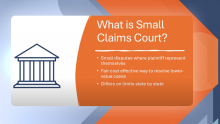Understanding Small Claims Court and Your Legal Plan Coverage

Your LegalEASE Plan is designed to provide access to attorneys for a wide range of personal legal matters. However, not all legal issues require full attorney representation, especially when the cost of legal action outweighs the potential recovery. In most cases, Small Claims Court is the best option for resolving disputes efficiently and affordably.
Why Some Legal Matters Aren’t Suited for State or Federal Court
While many legal matters can be pursued in court, certain disputes cannot be pursued in state or federal court because of the value of the case is too low. In these cases, the cost of legal services may exceed the value of the claim, making it financially impractical to proceed in a state or federal court.
For this reason, Small Claims Court exists—providing an accessible forum for individuals to seek compensation for lower-value disputes. Each state sets its own jurisdictional limits for Small Claims Court, but the process is designed for cases where hiring an attorney would not be cost-effective.
What Your Legal Plan Does Not Cover
Your legal plan excludes certain legal matters based on financial feasibility and legal merit. Coverage is not available for:
- Frivolous (as legally defined) or meritless claims that lack a strong legal basis.
- Cases where attorney fees would exceed the amount in dispute, making representation impractical.
- Lawsuits involving stress or emotional distress claims, except in rare cases where statutory damages apply.
- Consumer or small claims disputes where the member is not actively pursuing a resolution before considering legal action.
The goal of your legal plan is to support members in cases where legal representation is appropriate and financially justifiable - not to subsidize lawsuits that would not typically be pursued due to high costs. Your legal plan cannot be used to bring a case that would not be typically pursued in a state or federal court. But Small Claims Court may be able to fill this role.
Examples: When Small Claims Court Is the Right Choice
To better understand when Small Claims Court is the best option, consider these two real-world examples:
Example 1: A $43 Overcharge from a Cell Phone Carrier
A member notices a $43 billing error on their monthly phone bill. While frustrating, hiring an attorney would be unrealistic, as legal fees would quickly surpass the amount in dispute. Additionally, courts rarely award damages for inconvenience in cases like these.
Solution: Small Claims Court provides a straightforward way to resolve the issue without excessive legal costs.
Example 2: An $18,000 Home Repair Dispute
A contractor fails to complete a home renovation, leaving the member with $18,000 in damages. While this amount is significant, taking the case to state or federal court would likely cost more than the claim itself.
Estimated legal costs:
- Attorney fees: $30,000+
- Filing fees, depositions, and expert witness testimony: $10,000+
By the time the case reaches court, the legal fees and expenses could far exceed the potential recovery, making litigation impractical.
Solution: If the claim falls within the state’s Small Claims Court limit, the member can file on their own and seek partial recovery in a cost-effective way.
Your Legal Plan and Access to the Legal System
Your legal plan is not designed to expand access to the legal system beyond what you could access without the legal plan; it provides coverage for legal matters that would reasonably require an attorney to pursue a significant value loss.
For cases where hiring an attorney does not make financial sense, Small Claims Court is the appropriate solution. Even if full recovery is not possible, members can still seek compensation without incurring excessive legal costs.
Final Thoughts
BBefore pursuing legal action, it’s important to assess whether Small Claims Court is the better path. If you are unsure, your legal plan can still provide consultations and guidance to help you determine the best course of action.
For more information, contact us today to explore your legal benefits.
